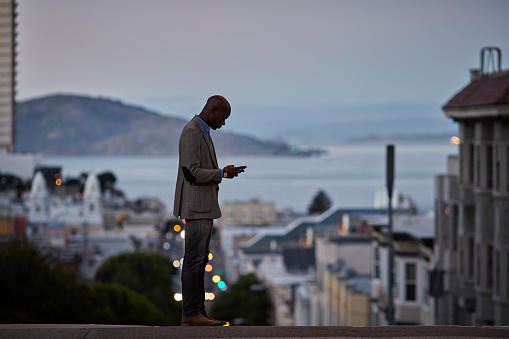It’s an undeniable fact that Black people drive popular culture and tech is no different. Although a digital divide still persists — Black people are less likely to have access to the internet at home — that doesn’t mean we aren’t online and driving the world’s most popular trends.
Take Twitter for example. Black people have dominated the platform since its inception and Black Twitter has been at the center of the biggest cultural moments of the past decade. In fact, as of 2018, of the 67 million users on Twitter, 28 percent were black, according to Nielson.
That same study shows other upward digital trends for Black people. The African American podcast audience has skyrocketed 70 percent from 2014-2017, and 73 percent of African Americans 13 and older play video games, an industry notorious for using Black culture without paying the people who create it.
Although Black people continue to be one of the main drivers behind the tech industry, we aren’t receiving many of its financial benefits.
Two years ago, tech’s five biggest players — Alphabet, Facebook, Microsoft, Apple, and Amazon — were valued at over $3 trillion when combined. To put that into perspective, those five companies were worth more than the entire economy of the United Kingdom. According to Inc., only four national economies are larger than the combined tech giants: the United States, China, Japan, and Germany.
With the tech industry rapidly expanding, many wonder if it may be the key to putting a dent in the ever-widening racial wealth gap. After all, it’s no secret that you can make a lot of money as an individual in the tech industry. The value of global corporations aside, the average software engineer in the U.S. can expect to make around $84,000 per year. Plus, there’s the opportunity to earn more from stock, bonuses, etc. Overall, the salary found in a lot of tech positions is nothing to scoff at, but for tech to even pretend to be a partial solution to the racial wealth gap, Black people would have to get hired.
Right now, the tech industry is predominately white and male. About 83 percent of tech’s executives are white, according to the U.S. Equal Employment Opportunity Commission. Although it seems that every year some big company steps forward with intentions to increase their diversity, not much has changed. Black people may be shaping how tech is used, but that doesn’t translate to the makeup of tech’s workforce.
Recently, Twitter’s diversity report revealed that the company’s workforce is still less than 5 percent Black. The numbers don’t get much better for Google and Facebook, where Black representation in their workforces is only at 3.3 and 1.5 percent.
Tech feeding off of Black cool is a parasitic relationship with impacts that translate outside of the digital sphere. The heart of America’s tech industry is considered to be Silicon Valley, and as the tech industry thrives, it’s shifted the economics of local communities in ways that often leave Black and brown people suffering.
For example, the housing crisis within the Bay Area is considered one of the worst in the country. Although Black people still make up almost 6 percent of San Francisco’s population and about 25 percent in neighboring Oakland, they still aren’t getting hired in Silicon Valley. A 2018 report by Reveal found that ten large Silicon Valley companies didn’t hire any Black women in the year of 2016. The report referred to gender and racial disparities as “grave.”
Plus, while entrepreneurship is often touted as a way to defeat the wealth gap, there are big disparities when it comes to startups. The number of Black women founded tech startups has more than doubled since 2016, according to ProjectDiane, but those who do have a startup are not receiving adequate funding. Since 2009, Black women-led startups have received .0006% of the $424.7 billion in total tech venture funding, the report found.
One thing people have to remember when talking about tech and its relationship to Black people is that we’ve seen it all unfold before. While Facebook and Twitter may be fairly new, tech as a whole is not. Marc Morial, CEO of the National Urban League, pointed out to Vox that Black Americans have often been left behind when the country sees technological advancements.
“… be it when slavery and Reconstruction blocked black people from the benefits of farming technology, or when technological revolutions in the North were less accessible to poor black people fleeing the South. Over generations, the effect of this lack of inclusion has compounded, leading us to the disparities that exist today.”
In addition, the development of technology often depended on using Black people as test subjects without their consent — a problem that plagues the medical industry in particular.
Currently, Black people are working hard to carve out space for themselves in tech away from some of the big names. Organizations like Data for Black Lives engage data science as a way to create concrete and measurable change in the lives of Black people. There’s also Black in AI, which seeks to increase the presence of Black people in the field of artificial intelligence.
Meanwhile, cities like Austin and Atlanta are transforming into tech hubs. However, people have to be careful to avoid replicating the horrific gentrification seen throughout Silicon Valley. After all, Black people who may not be in the tech industry deserve to remain in the cities that they call “home.”
Black people have been the force behind “American” culture for decades. Our language, music, and way of being have been taken from us without credit time and time again. The tech industry is no exception, but people can still create space outside of the mainstream to credit and recognize its true entrepreneurs and innovators.
This piece originally published on July 18, 2019.

